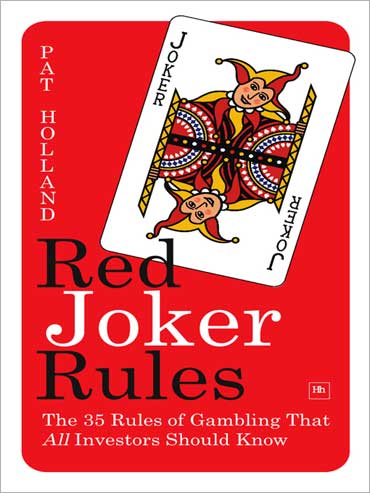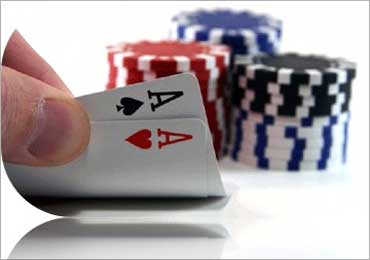
The Red Joker is the most powerful card in poker and many other card games. The Red Joker, therefore, has vast experience of what works in gambling - and what doesn't.
Here is some sparkling advice from the Red Joker, the gambler par excellence, to the investor.
Let's now eavesdrop on what the Red Joker is telling the investor.
The Red Joker (RJ) sat at a plain wooden table covered in dust.
While we watched, he wrote absent-mindedly in the dust with a finger as long and as pale as a candle.
His tunic and hat blazed scarlet and gold. Tiny bells swung noiselessly from the lobes of his hat and the collar that covered his shoulders.
His other hand moved stacks of what might have been old gold coins, or scarlet chips.
'Enter', he said.
He did not rise, but indicated that the common man (CM) should sit opposite him.
'Red Joker Rules', he said, and began...
...

CM: Thank you, Sir. Let me begin by asking why we should concern ourselves with good gambling principles.
RJ: (Because) gambling is investing. Consider a poker player who is dealt a total of 200 hands in an average session.
For each of these hands, he will have to decide whether or not to risk money by playing it further. He is already an investor.
He will further have to decide, on the basis of other cards dealt to his hand, whether he should raise the investment or write it off - perhaps half a dozen times in a single hand.
There is no difference in deciding that a full house is worth investing in, or discarding - regardless of whether that house is three tens and two jacks in your hand, or a semi-detached for sale by a one-eyed retired night watchman in East Helsinki.
Weigh the factors, commit the money. And because of the pace of gambling, the core principles become obvious much more quickly.
...

CM: But gamblers lose and investors gain.
RJ: I doubt that you would have been better off snapping up shares in Wall Street in 1929 than playing gin rummy under my watchful eye in a Brooklyn basement.
But I take your point.
There is a level of difference in that gambling operates on a diminishing pool of cash, eaten away by the profit margins of casinos and bookmakers, and that investing operates on an increasing pool of cash, expanding along with your progress as a species.
A rough rule of thumb is that investment offers a positive return of 10 per cent per annum over the long haul, and bookmakers offer a negative return of 10 per cent or less.
But that is not the point.
The point is that the principles of good gambling can cut that negative return to almost zero, and failure to observe similar principles in investment will cut the positive return to almost zero.
Here are some of those rules.
...

Start early
Red Joker: Successful gamblers start early. The Irish gambler, JP "The Sundance Kid" McManus, missed an important examination at the age of sixteen because he went downtown to back a sure-fire can't-lose shirt- swallowing racing certainty.
CM: Needless to say, he lost both the race and the exam.
RJ: It failed to stop him. He had started in time.
By contrast, the gambler who arrives at the racecourse in a flustered state just as the horses are cantering down for the fifth race on the card isn't going to win much.
Even when his judgement isn't impaired he can't parlay his winnings upwards.
And, of course, that once in a billion gambler whose twelve-horse each-way 10p accumulator wins him pound 254,638.18 wouldn't have won it if he'd not been waiting outside the betting emporium before it opened.
...

CM: The time to start investing is now. Right now?
RJ: The fruits of the parlay cannot come your way unless you get in early. Investing is a lifetime thing. Don't dither. At the very least, take advantage of the best pension or savings scheme your pay packet can afford.
At best, if you are young (and, in our long-lived society, anything up to 60 is at least a little young) put some money into a solid long-term self-parlaying product such as an index tracker or an exchange- traded fund.
Sure, the stock market is a volatile place, but the long-term maths indicates that a carefully chosen bundle will parlay up at a steady 10 per cent per year.
That puts it far ahead of inflation, and the difference grows all the time.
You can, of course, expand your parlay much faster if you take to day trading, spread betting, and the other investment and gambling games.
If you do, then reread the introduction to this section. It is important to pile up your winnings - but much, much, much more important to limit your losses.
...

Keep a reserve tank
Red Joker: Hand-in-hand with the concept of never offering an unlimited parlay goes the concept of keeping a reserve tank.
Some gambling situations, notably in blackjack, craps, and the photo finish in racing, throw up situations where the best play unexpectedly calls for the gambler to raise his stake.
In the photo finish situation, for example, the gambler may be able to totally insure profit on a race by betting on the horse which may, or may not, have beaten his choice.
In Blackjack, favourable opportunities to split or go down for double may cluster and call for a raise of stakes.
CM: We must, then, ring-fence a certain portion of our stake at the very beginning to take advantage of those situations?
RJ: Yes, and you can continue to earn profits. In the investing situation, it is only necessary to keep part of your overall investment in funds that can be easily converted to cash.
If all your investments are in stocks or property and you face either an unexpected opportunity or an unexpected disaster, you may have to sell them off for less than they are worth.
...

CM: Or worse, go into debt.
RJ: Where you may remain indefinitely and even be forced to leave the investment world forever.
The advice, then, is to keep not less than 20% of what you can invest in deposit accounts, bonds, Post Office savings accounts, or anywhere that permits you to access the full amount at short notice.
Never chase your losses
RJ: Every gambler knows that you should never chase your losses.
CM (wincing): And almost every gambler, from time to time, gets emotional and does just that. I speak from experience.
RJ: Chasing your losses is a phrase that describes the nightmare that can follow losing your stake on a series of races, hands of cards, or casino bets.
You can walk away. You have partly turned on your heel and composed your features ... but, no, you're going to show them ... you're going to wipe the smile off their faces and get it all back in one big flourish.
You're going to stay on that last hand regardless of what you are dealt, and bet the limit.
You are going to punish the bookies with the biggest C-note you can find in the housekeeping money.
...

CM: Dark and deep and dangerous waters.
RJ: Of course, you lose, and resolve to win it all back next week. And you don't. The advantage lies with the enemy. You are on the wrong end of the parlay.
CM: Surely investors don't do that?
RJ: Chasing your losses, or even your lower-than- expected gains, is endemic among the more speculative kinds of investors. They lack that professional gambler's patience.
So when it's not going as it should, unleash that professional gambler's patience.
Do NOT start trading like mad.
Do NOT dump everything you've got in order to start again.
Do NOT start using money you don't have or can't really raise.
Do NOT start applying six-month tactics to your ten- year programmes.
Unless it's really Armageddon, let it sit.
CM: And, if it is Armageddon?
RJ: Take your losses. And start, modestly, all over again.
(Excerpt from Red Joker Rules: The 35 Rules of Gambling that All Investors Should Know. Published by Vision Books.)
(C) All rights reserved